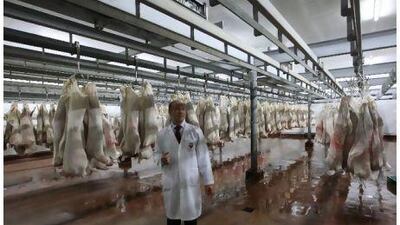ABU DHABI // As butchers sharpen their knives for Eid Al Adha, public health officials say they cannot eliminate home slaughtering in the emirate unless the community helps them.
Butchering animals at home, which is outlawed in Abu Dhabi but not uncommon, is risky and can expose people to food poisoning, parasites and disease.
But each year during the holiday many residents break the law: sometimes because it is traditional, sometimes to avoid queues at government-operated slaughterhouses, and often because it is easier.
"Lazy," said Khaleefa Al Romaithi, the director of public health at the municipality. "They are too lazy to take their animal to the slaughterhouse."
A poll on The National's website this month found 52 per cent of respondents, or 317 people, preferred to butcher animals at home rather than go to an abattoir or use a licensed butcher.
Despite threats of criminal prosecution and a Dh2,000 fine, many violators evade punishment.
An unlicensed butcher whose sheep leapt from atop a five-storey building was arrested this month, and officials say he and the animal's owner have been referred to prosecution.
But during Eid Al Adha last year only three unlicensed slaughters were discovered, and the butchers and people that hired them all escaped, Mr Al Romaithi said.
Officials cannot effectively stop home slaughtering unless residents stop hiring unlicensed butchers and start turning them in to police, he said.
"People need more awareness about diseases and how dangerous it can be," Mr Al Romaithi said.
On Eid Al Adha, expected to be on November 6, many Muslims slaughter sheep, goats or other animals and give some of the meat to the poor, commemorating the willingness of the Prophet Ibrahim to sacrifice his son.
Some unlicensed butchers capitalise on the holiday by charging customers as much as Dh150 for a job that costs Dh15 at a government-operated abattoir, Mr Al Romaithi said.
"Sometimes they say, 'We know how to do it'," he said. "And they don't know the right way, the Islamic way."
Mr Al Romaithi said unlicensed butchers did not have to sterilise their knives and sometimes slaughtered animals on the ground, exposing meat to contaminants.
And more than 200 diseases can pass between animals and humans, said Dr Najdat Nour, the head of veterinary control at the municipality's public health division.
At public slaughterhouses, veterinarians check live animals for parasites, mange, fleas and ringworm. Even more important, they check dead animals for Rift Valley fever, tuberculosis, tetanus, brucellosis and more, Dr Nour said.
"You are looking for a credit from God, so if you want the right credit you should make sure your meat is healthy," Mr Al Romaithi said. "You don't want to give bad meat to poor people."
Ahmed Saif, 31, from Abu Dhabi, said he always took his animals to government-operated slaughterhouses because the process was much cleaner.
Mr Saif said that on Monday he visited the public slaughterhouse at Al Mina to have an animal butchered, and from the waiting room watched a slaughterman at work.
Inside, the butcher pulled goats and sheep from wheelbarrows one by one and laid them over a grate, facing Mecca. He slit their throats with one slice.
Workers wearing jumpsuits, rubber gloves and plastic beard-covers worked around him, skinning animals, washing carcasses and carving meat.Many customers like to oversee the process, said Dr Raif Arnaout, a senior veterinarian for the municipality.
The Al Mina slaughterhouse butchers about 500 animals on a normal day, Dr Arnaout said. On the first day of Eid Al Adha, it would probably process thousands.
Overall, Abu Dhabi Municipality expects 11,000 animals to pass through government-operated slaughterhouses during the holiday.
"This is a huge occasion for us," Dr Nour said.
Mr Al Romaithi said he was confident the slaughterhouses, with extra butchers on staff, could handle the surge in demand.
"The first day, early morning, everyone is running to us," he said, advising customers to be patient and to consider arriving in the afternoon.
"We can do 200 per hour but we cannot do 1,000 per hour."

